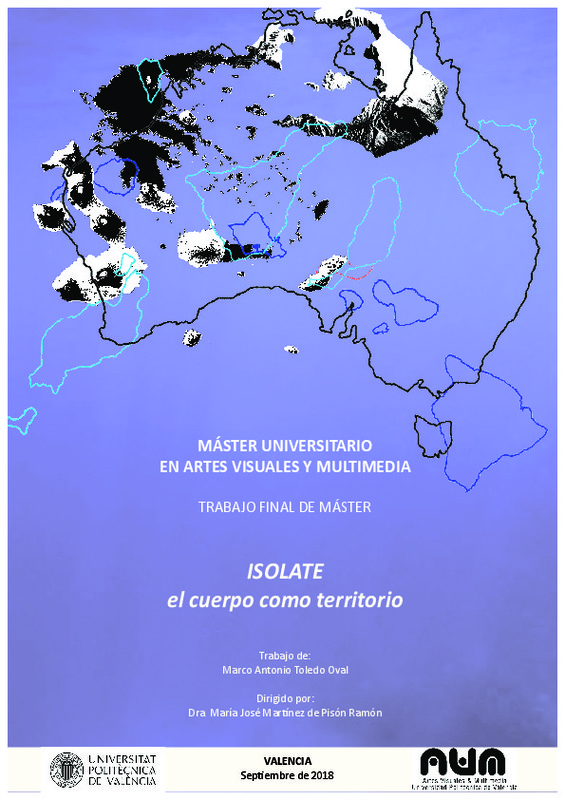JavaScript is disabled for your browser. Some features of this site may not work without it.
Buscar en RiuNet
Listar
Mi cuenta
Estadísticas
Ayuda RiuNet
Admin. UPV
ISOLATE, el cuerpo como territorio
Mostrar el registro sencillo del ítem
Ficheros en el ítem
| dc.contributor.advisor | Martínez de Pisón Ramón, Mª José
|
es_ES |
| dc.contributor.author | Toledo Oval, Marco Antonio
|
es_ES |
| dc.coverage.spatial | east=-77.78116699999998; north=21.521757; name=Cuba | es_ES |
| dc.coverage.spatial | east=-16.629130400000008; north=28.29156369999999; name= Espanya | es_ES |
| dc.date.accessioned | 2018-12-17T07:14:26Z | |
| dc.date.available | 2018-12-17T07:14:26Z | |
| dc.date.created | 2018-09-25 | |
| dc.date.issued | 2018-12-17 | es_ES |
| dc.identifier.uri | http://hdl.handle.net/10251/113863 | |
| dc.description.abstract | ISOLATE, el cuerpo como territorio, es una instalación audiovisual interactiva basada en la superposición simbólica de paisajes sonoros e imágenes que interactúan con el usuario al detectar el sistema técnico su presencia; entonces se activan sonidos de voces múltiples en el antiguo idioma 'Amazig' y otros idiomas aborígenes de culturas sometidas. A su vez, dos capas de imágenes se proyectan, representando metafóricamente las ideas de territorio, control y libertad del cuerpo del usuario en el espacio. La presencia del usuario y su detección, mediante una cámara colocada en el techo, permite incorporar su cuerpo como territorio sobre la imagen-movimiento del mar como fondo. Esto establece un nexo de unión entre cualquier cuerpo, sin necesidad de definir su identidad, con el objetivo de trasmitir simbólicamente la idea de que todo cuerpo pertenece a un espacio delimitado, sometido y/o subordinado a un territorio, donde habita el ser corpóreo que busca su liberación, su autonomía, aunque esté controlado por el sistema; en este caso, técnica y metafóricamente, este control se realiza mediante el sistema de tracking video. La instalación invita al usuario a experimentar un entorno reactivo donde cada individuo, cada cuerpo, se transforma, simbólicamente, en un territorio flotante, una isla en libertad. Esto permite una reflexión sobre las nociones de identidad, cuerpo y su espacio delimitado en el territorio, en la tierra, lugar donde habita el ser corpóreo y que aspira a ser libre, aislado como las islas, autónomo, de ahí el título. Cuando intervienen varios usuarios, por agregación y/o separación de unidades se puede formar simbólicamente un archipiélago, o un continente. | es_ES |
| dc.description.abstract | ISOLATE, the body as a territory, is an interactive audiovisual installation based on the symbolic superposition of sound landscapes and pictures. The work interacts with the viewer when the technical system detects their presence; then multiple voices sounds are activated in the antique 'Amazig' language and other missing languages. Simultaneously, two layers of images are projected, representing metaphorically the ideas of territory, control and freedom of the user's body in space. The presence of the user and its detection, through a camera placed on the ceiling, allows to incorporate his body as a territory on the image-movement of the sea as a background. This establishes a link between any body, without the need to define its identity, with the aim to transmit symbolically the idea that every body belongs to a delimited space, submitted and subordinated to a territory, where the corporeal being who seeks its liberation, its autonomy, although it is controlled by the system; in this case, this control is carried out technically and metaphorically through the video tracking system. The installation invites the spectator to experience a reactive environment where each individual, each body, is transformed, symbolically, into a floating territory, an island in freedom. This allows a reflection on the notions of identity, body and its delimited space in the territory, on the earth, place where the corporeal occupy and that aspires to be free, isolated as the islands, autonomous, reason of the title. When several users join in, by aggregation and separation this bodies can be formed symbolically an archipelago, or a continent. | es_ES |
| dc.language | Español | es_ES |
| dc.publisher | Universitat Politècnica de València | es_ES |
| dc.rights | Reconocimiento - No comercial - Compartir igual (by-nc-sa) | es_ES |
| dc.subject | INTERACTIVIDAD | es_ES |
| dc.subject | COMPOSICIÓN SONORA | es_ES |
| dc.subject | VIDEO TRACKING | es_ES |
| dc.subject | SOMETIMIENTO | es_ES |
| dc.subject | CUERPO | es_ES |
| dc.subject | IDENTIDAD | es_ES |
| dc.subject | TERRITORIO | es_ES |
| dc.subject | ISLA | es_ES |
| dc.subject | COLONIALISMO | es_ES |
| dc.subject | INTERACTIVITY | es_ES |
| dc.subject | SOUND COMPOSITION | es_ES |
| dc.subject | SUBMISSION | es_ES |
| dc.subject | BODY | es_ES |
| dc.subject | IDENTITY | es_ES |
| dc.subject | TERRITORY | es_ES |
| dc.subject | ISLAND | es_ES |
| dc.subject | COLONIALISM | es_ES |
| dc.subject.classification | PINTURA | es_ES |
| dc.subject.other | Máster Universitario en Artes Visuales y Multimedia-Màster Universitari en Arts Visuals i Multimèdia | es_ES |
| dc.title | ISOLATE, el cuerpo como territorio | es_ES |
| dc.type | Tesis de máster | es_ES |
| dc.rights.accessRights | Abierto | es_ES |
| dc.contributor.affiliation | Universitat Politècnica de València. Departamento de Pintura - Departament de Pintura | es_ES |
| dc.description.bibliographicCitation | Toledo Oval, MA. (2018). ISOLATE, el cuerpo como territorio. http://hdl.handle.net/10251/113863 | es_ES |
| dc.description.accrualMethod | TFGM | es_ES |
| dc.relation.pasarela | TFGM\95800 | es_ES |






